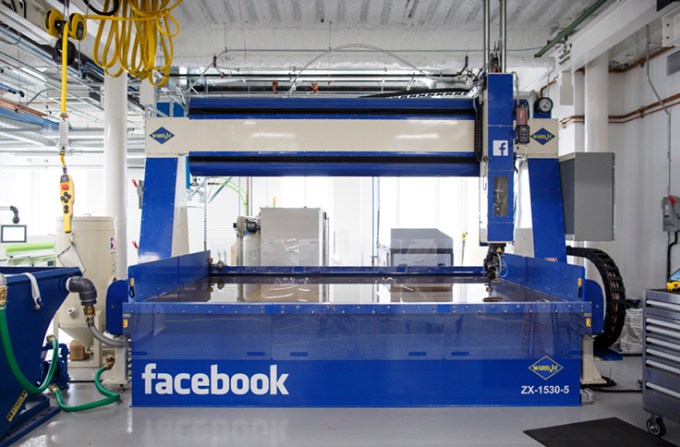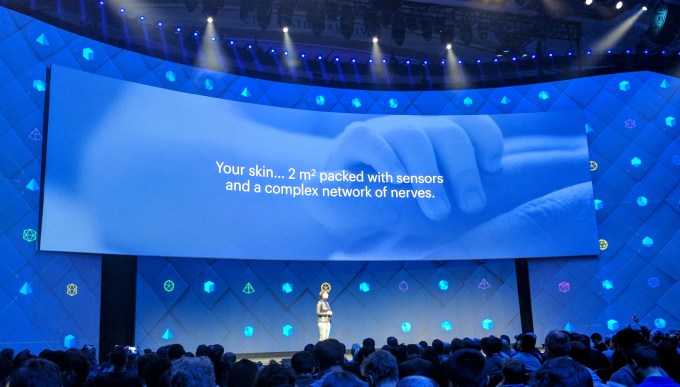Today at F8, Facebook revealed it has a team of 60 engineers working on building a brain-computer interface that will let you type with just your mind without invasive implants. The team plans to use optical imaging to scan your brain a hundred times per second to detect you speaking silently in your head, and translate it into text.
Regina Dugan, the head of Facebook’s R&D division Building 8, explained to conference attendees that the goal is to eventually allow people to type at 100 words per minute, 5X faster than typing on a phone, with just your mind.
Eventually, brain-computer interfaces could let people control augmented reality and virtual reality experiences with their mind instead of a screen or controller. Facebook’s CEO and CTO teased these details of this “direct brain interface” technology over the last two days at F8.
Brain-Typing
“What if you could type directly from your brain?” Dugan asked. She showed a video of a paralyzed medical patient at Stanford who can type using their mind thanks to an implanted sensor. She went on to explain how Facebook wants to do this without surgical implants.
Building 8 only began working on the brain typing project six months ago, but it now is collaborating with UC San Francisco, UC Berkeley, Johns Hopkins Medicine, Johns Hopkins University’s Applied Physics Laboratory and Washington University School of Medicine in St. Louis. Researchers who specialize in machine learning for decoding speech and language, building optical neuroimaging systems with advanced spatial resolution and next-generation neural prosthetics are involved.

The plan is to eventually build non-implanted devices that can ship at scale. And to tamp down on the inevitable fear this research will inspire, Facebook tells me “This isn’t about decoding random thoughts. This is about decoding the words you’ve already decided to share by sending them to the speech center of your brain.” Facebook likened it to how you take lots of photos but only share some of them. Even with its device, Facebook says you’ll be able to think freely but only turn some thoughts into text.
Skin-Hearing
Meanwhile, Building 8 is working on a way for humans to hear through their skin. It’s been building prototypes of hardware and software that let your skin mimic the cochlea in your ear that translates sound into specific frequencies for your brain. This technology could let deaf people essentially “hear” by bypassing their ears.
A team of Facebook engineers was shown experimenting with hearing through skin using a system of actuators tuned to 16 frequency bands. A test subject was able to develop a vocabulary of nine words they could hear through their skin.

To underscore the gravity of Building 8s mind-reading technology, Dugan started her talk by saying she’s never seen something as powerful as the smartphone “that didn’t have unintended consequences.” She mentioned that we’d all be better off if we looked up from our phones every so often. But at the same time, she believes technology can foster empathy, education and global community.
Building 8’s Big Reveal
Facebook hired Dugan last year to lead its secretive new Building 8 research lab. She had previously run Google’s Advanced Technology And Products division, and was formerly a head of DARPA.
Facebook built a special Area 404 wing of its Menlo Park headquarters with tons of mechanical engineering equipment to help Dugan’s team quickly prototype new hardware. In December, it signed rapid collaboration deals with Stanford, Harvard, MIT and more to get academia’s assistance.
Yet until now, nobody really knew what Building 8 was…building. Business Insider had reported on Building 8’s job listings and that it might show off news at F8.
According to these job listings, Facebook is looking for a Brain-Computer Interface Engineer “who will be responsible for working on a 2-year B8 project focused on developing advanced BCI technologies.” Responsibilities include “Application of machine learning methods, including encoding and decoding models, to neuroimaging and electrophysiological data.” It’s also looking for a Neural Imaging Engineer who will be “focused on developing novel non-invasive neuroimaging technologies” who will “Design and evaluate novel neural imaging methods based on optical, RF, ultrasound, or other entirely non-invasive approaches.”
Elon Musk has been developing his own startup called Neuralink for creating brain interfaces.

Facebook has built hardware before to mixed success. It made an Android phone with HTC called the First to host its Facebook Home operating system. That flopped. Since then, Facebook proper has turned its attention away from consumer gadgetry and toward connectivity. It’s built the Terragraph Wi-Fi nodes, Project ARIES antenna, Aquila solar-powered drone and its own connectivity-beaming satellite from its internet access initiative — though that blew up on the launch pad when the SpaceX vehicle carrying it exploded.
Facebook has built and open sourced its Surround 360 camera. As for back-end infrastructure, it’s developed an open-rack network switch called Wedge, the Open Vault for storage, plus sensors for the Telecom Infra Project’s OpenCellular platform. And finally, through its acquisition of Oculus, Facebook has built wired and mobile virtual reality headsets.

But as Facebook grows, it has the resources and talent to try new approaches in hardware. With over 1.8 billion users connected to just its main Facebook app, the company has a massive funnel of potential guinea pigs for its experiments.
Today’s announcements are naturally unsettling. Hearing about a tiny startup developing these advanced technologies might have conjured images of governments or coporate conglomerates one day reading our mind to detect thought crime, like in 1984. Facebook’s scale makes that future feel more plausible, no matter how much Zuckerberg and Dugan try to position the company as benevolent and compassionate. The more Facebook can do to institute safe-guards, independent monitoring, and transparency around how brain-interface technology is built and tested, the more receptive it might find the public.

A week ago Facebook was being criticized as nothing but a Snapchat copycat that had stopped innovating. Today’s demos seemed design to dismantle that argument and keep top engineering talent knocking on its door.
“Do you want to work for the company who pioneered putting augmented reality dog ears on teens, or the one that pioneered typing with telepathy?” You don’t have to say anything. For Facebook, thinking might be enough.






























Comment